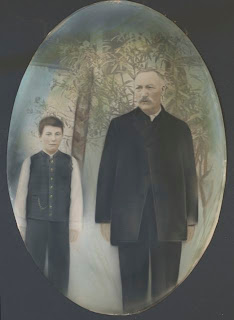 |
| The blue flowers are "forget-me-nots" |
For one thing, she chastises him for sending her such a “short” response, making clear she hasn’t yet seen the May 25th letter in which he exhorts her, in determined pleadings, to come to America (“If you love me, you will come here”).
She’s also annoyed that he has told her not to show his writing to anyone else, and yet recently has written to her (prior to May 25th) on a postcard which anyone can read. She, however, sends this postcard in an envelope (the entire back is filled with her writing, with no space for an address.)
Below is an approximate translation.
Note: Sepp is a nickname for Josef (think of the Italian for Josef, GiuSEPPe, and it makes sense):
May 30, 1911
Dearest Sepp,
Thank you for all your letters and also postcards, which I’ve received. But your answer to my long letter is very short. Also, you asked me to keep all the writing from you to me hidden from the eyes of others, but then you send me a post card where everyone can read what you say! That’s the main reason I feel annoyed and am uncertain if I should make the trip to America.
But just like the flowers [bloom] on this card [forget-me-nots], joy blooms in my heart because I know that I love you and that you love me. God knows what is right. I have in mind that I should come.
Picture this:
You are a twenty-three year old young woman--one hundred years ago. You were raised in a small town of all German-speaking people, and now work in the larger town eighteen miles away. You secured an enviable job with one of the most prominent families in the area, a family of merchants, politicians, church luminaries, doctors. You’ve served them well, especially the mistress of the house, been responsible for the vast staff she has to feed and manage, taken care of her little daughter and loved her as your own.
But the love of your life has traveled to a strange land 5,000 miles distant--a land where you won’t understand the language, have no idea of the customs, habits, expectations. He sees the opportunities in America and has made it clear: he will never come back to Transylvania. He wants you to come to marry him…now! He doesn’t want to wait, and “if you love me,” he says, “you will come here to marry me.” (see If you love me...)
The translation is difficult, but it seems Lisi is leaning toward joining Josef in America. But by the time she writes again, she will have received Josef's desperate pitch ("If you don't come here, I know you don't love me." see If you love me...). Her response on June 7, 1911 -- up next.














